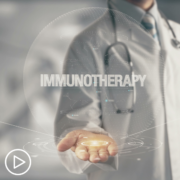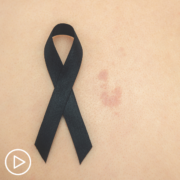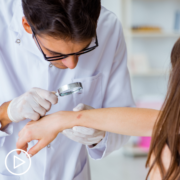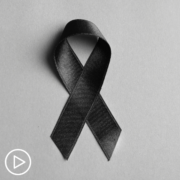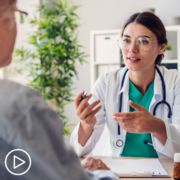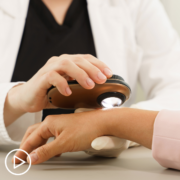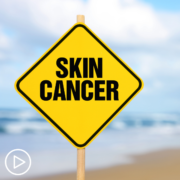What advanced non-melanoma skin cancer therapies might comprise a treatment plan? Dr. Soo Park discusses therapy types, the impact of molecular testing, and shares key questions to ask about your treatment plan.
Dr. Soo Park is a Medical Oncologist at Moores Cancer Center at UC San Diego Health. Learn more about Dr. Park.
Related Resources:
Transcript:
Katherine:
So, what is the typical treatment path for someone who’s been diagnosed at this stage of disease, at the advanced stage?
Dr. Park:
Yeah, so, before – and I really love this question, because in the past, we did not have that much to offer patients except surgery, and then they would get a very extensive surgery. They would get reconstruction. But sometimes it’s hard to get reconstruction after a really major surgery, because you have to heal, and you have to get better. And then, after the surgery, you would typically get radiation to try to prevent the cancer from coming back. But nowadays, we have immune therapy.
So, immune therapy is a certain type of IV medicine that’s not chemotherapy that works really well for squamous cell skin cancer. And so, nowadays, we can actually give this to you before surgery. So, we can give you a couple of doses of this IV immune therapy medicine before surgery, and really shrink your tumor quite dramatically.
And then, that makes the surgery a lot easier, smaller. And then, sometimes after we do the surgery, and then we look at what the surgeon has taken out under the microscope, we can’t see any tumor left. And that’s really amazing, because then sometimes we don’t even need to do radiation. So, not only did we make your tumor a lot smaller, sometimes we completely made it go away.
And then, if that happens, sometimes we don’t even need to do radiation. So, it really helps the patient. And I think this is really important, because this is somewhat newer data, and I still see patients that get referred to me for just surgery.
But I think a lot of head and neck surgeons are now aware of this data. And so, this is something that’s, I think, becoming more common.
Katherine:
What about targeted therapies?
Dr. Park:
So, targeted therapies are, I think, mainly used in basal cell skin cancer. So, targeted therapies are typically oral medications or pills. They’re called targeted, because they’re used in cancers that have a specific target. So, for example, the basal cell skin cancer, the target is the hedgehog pathway, because the hedgehog pathway is abnormal. And so, these pills, they specifically target the hedgehog pathway. But for squamous cell skin cancer, we don’t have any true targeted therapies.
Katherine:
As patients are reviewing their options with their doctor, what questions should they be asking about their care plan?
Dr. Park:
I think all patients should be asking, what the goal of the treatment is. They should be asking, especially if they’re being offered any type of treatment, what are the side effects? What can I expect from this, in terms of how much better will it make me? They should really ask about how often the treatments are given, because some patients have transportation issues or financial barriers, and we want to know about that, so we can help them.
Patients should also ask about any necessary blood work that is needed. They should ask what can they do in the future to prevent a similar type of cancer happening, and just make sure that they’re talking to their families, because I think social support is really important.
Katherine:
Yeah. I think it’s important for patients to ask how the cancer is going to impact their lives overall, really.
Dr. Park:
Yeah, exactly, because it will affect every single aspect of your life: your social life, your family life, your mental health, your physical well-being. And so, it’s really important to know and work with your doctor on what you think you can expect now, and also in the future.
Katherine:
Yeah. Well, how do test results impact treatment options, then?
Dr. Park:
So, there are sometimes when we have a skin cancer that actually happens inside a gland in your face. It’s one of the salivary glands in your face. And we sometimes don’t know if it’s a skin cancer that happened on the outside and that spread to the gland inside your face, or did it actually first just start inside the gland? Because a cancer that just starts inside the gland is not technically a skin cancer. It’s a different type of head-and-neck cancer, and it’s very, very rare, and it’s treated very differently.
So, nowadays, because we have that molecular testing, like I talked about, I see lots of patients where they have a cancer in their salivary or parotid gland. We don’t know where it came from. And so, we send it for molecular sequencing or molecular testing, and there are certain clues in the molecular testing that can tell us, oh, it probably actually came from a skin cancer.
You just didn’t know it; or maybe it’s the skin cancer that kind of was there and went away; or maybe it was a skin cancer you had like five years ago, that you didn’t think caused any problems, but it did spread, because knowing where it came from through molecular sequencing, if it’s really hard to find out where, really impacts the treatment I may give you.
Katherine:
What about side effects of these therapies? How are they managed?
Dr. Park:
Yeah, so, for immunotherapy, there’s one specific side effect that we don’t find with chemotherapy, and that’s really when your body’s own immune system kind of ends up attacking the other parts of your body. And so, it can cause inflammation of other organs. And so, for patients that experience that, it can be very mild, and it can be all the way to very severe, requiring a patient to go to the hospital.
But in all cases, we just have to tell the immune system to quiet down a bit, because it’s attacking your body. And so, the way we do that is we give the patient steroids. And so, if it’s really mild, maybe you have like a small rash; maybe we can just give you a steroid cream, or maybe we have to give you a steroid pill. But sometimes, if it’s really severe, we have to tell you to go to the hospital so you can get steroids through your IV.

